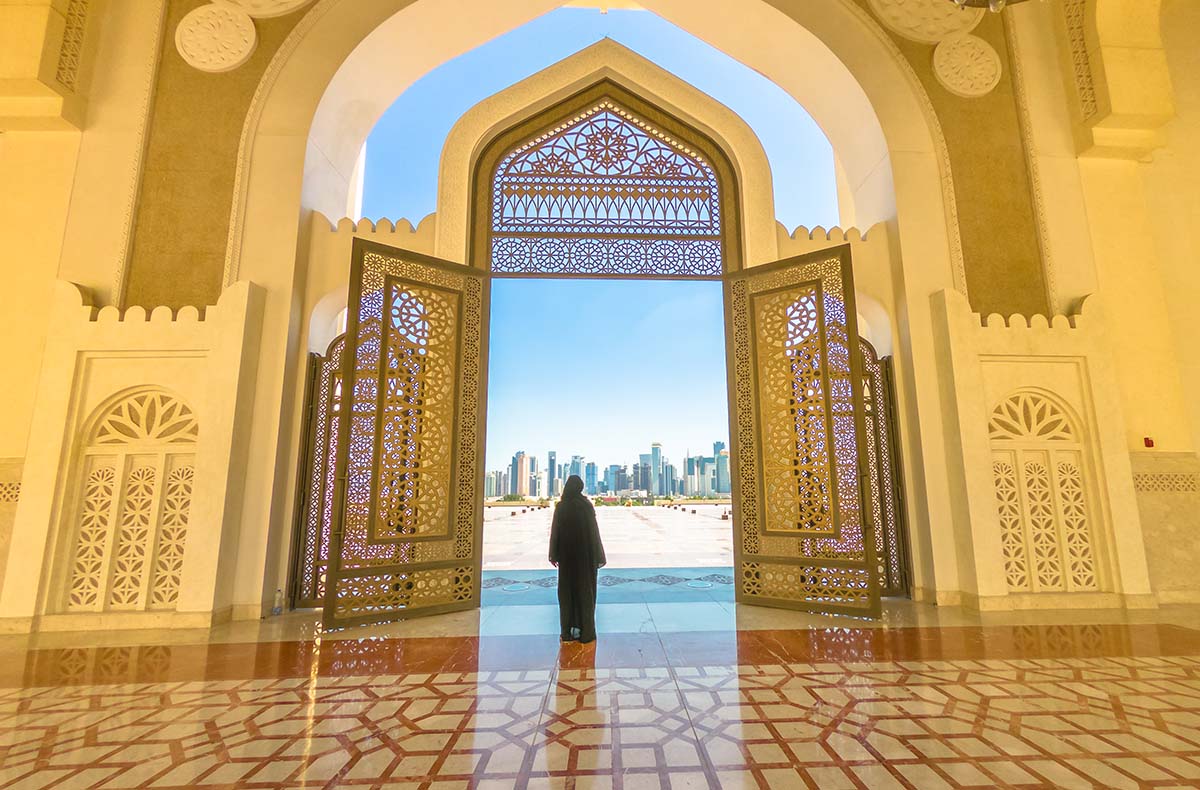
Next week, celebrities and top industry professionals will descend upon Doha, Qatar, to celebrate the arts, fashion, and philanthropy—and the world’s premier soccer tournament, the World Cup. Qatar is emerging as a hot-spot and international epicenter for fashion shows, sporting events, and global conferences. And with the World Cup starting on Sunday, many spectators will be watching Qatar as it hosts nearly 1.2 million visitors and 32 national soccer teams for the biggest global sporting event in the post-pandemic era. What the international community may also appreciate is that Doha’s journey to a modern metropolis took years of collaboration and development among Qataris of all walks of life—not least of which includes the nation’s women.
The Arabian Gulf is inherently viewed as a traditional one, where it is assumed that women do not share the same or equal rights as men do. This is evidenced in countries where—for example—a woman’s testimony is worth only half that of a man’s in court. And while women have only more recently been granted certain freedoms and liberties—like driving—in Qatar and other parts of the Middle East, women have been driving for many years. In fact, Qatar has historically been a leader in the Middle East in elevating women in society, including in the fields of education, business, the arts and humanities, and culture. These advances have dramatically changed the status of women in Qatar in a positive way.
The current position of women in Qatari society can be traced to the moment women were given the right to vote. Qatar declared its independence from Britain on September 3, 1971, and in 1997, women were granted the right to vote there, casting their first votes in 1999. Since then, it seems that a tidal wave of change began to occur for women in the country.
Sheika Moza bint Nasser, the mother of the current Emir, championed the charge to expand educational access for women. That expansion of educational access has allowed Qatari women to pursue careers in medicine, finance, architecture, law, technology, and more. In fact, women make up more than 60% of students enrolled in universities. Today, Sheika Nasser continues her quest to improve educational access for women and is a strong ambassador for that cause in the region.
Qatar is also well known for its robust arts and museum scene, which in recent months have been in the spotlight because of several international events. Orientalist art, which originated in modern-day Turkey, Greece, the Middle East, and North Africa, has been in particular focus. The arts scene can be directly attributed to Sheikha Al Mayassa bint Hamad Al-Thani. She has spearheaded the expansion of Qatar’s national museums, and serves as the co-chair of Fashion Trust Arabia. Her leadership has also attracted several industry leaders in the arts and fashion to Doha and has sparked the interest of luxury goods companies to conduct business in Qatar. These types of soft power initiatives, in which the arts and fashion world can be seen beyond politics and foreign affairs, is a cornerstone of Qatar’s hopes for its own legacy for years following its role as host to the World Cup this year.
Certainly, more work can be done to continue improving the role of women and the immigrant community in Qatari society. Through several established councils and the Qatar Foundation, the country has strongly encouraged women in society to participate socially, economically, and in government. This has allowed women to take center stage roles in the development and execution of World Cup planning and programs. In a recent panel with the U.S.-Qatar Business Council, several female Qatari leaders, including Sheikha Mayes bint Hamad Al Thani, stressed that the World Cup has served as a catalyst for women to grow within leadership positions in the country, furthering their and the nation’s social and economic development. In conjunction with hosting the global soccer tournament this year, Qatar is making efforts to build a legacy of growth and change for itself, and promoting sustainability, education and prosperity through a diversified and healthy economy.
Indeed, Qatar has made great strides to rebut the notion that it is not a safe place for women. The advances provide tangible proof that the country’s best days could still be ahead. The late Malcolm X noted that during his travels through Africa and the Middle East, he realized that “in every country that you go to, usually the degree of progress can never be separated from the woman.” He added, “If you are in a country that is progressive, the woman is progressive. If you’re in a country that reflects the consciousness toward the importance of education, it’s because the woman is aware of the importance of education. But in every backward country you’ll find the women are backward, and in every country where education is not stressed it’s because the women don’t have education.”
From educational and financial investments to their cultural and professional livelihoods, to the fearless leaders that champion progress, the future appears to be bright for women empowerment in Qatar.



